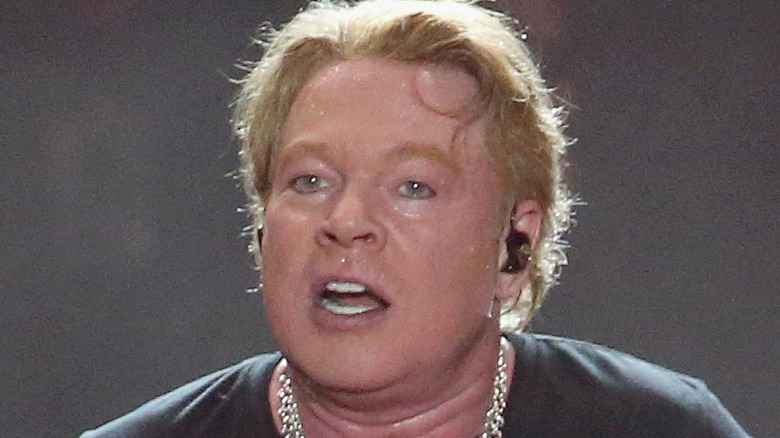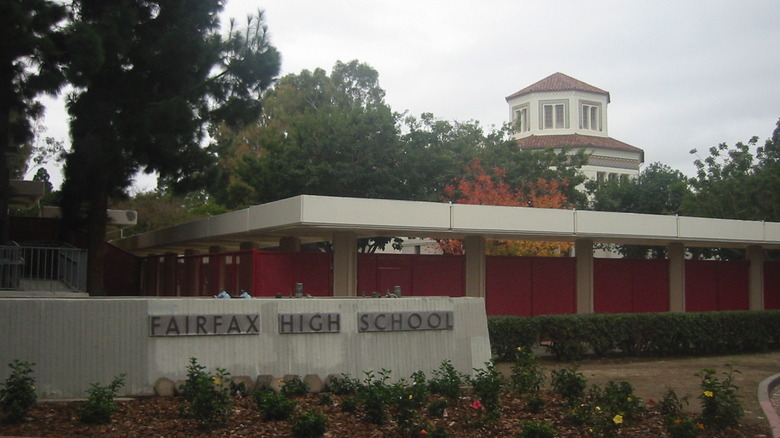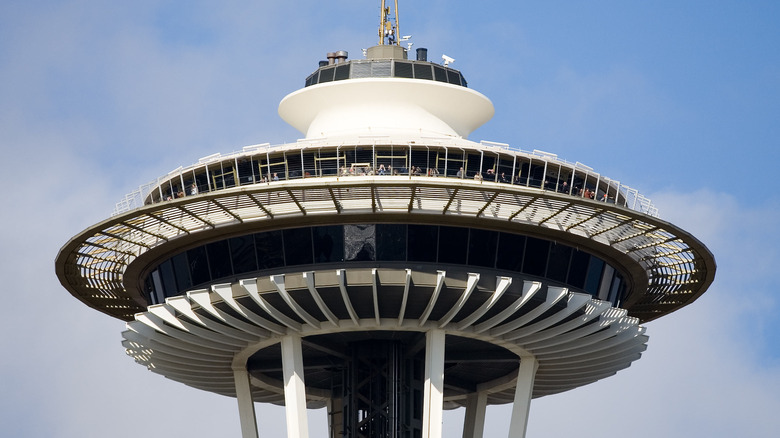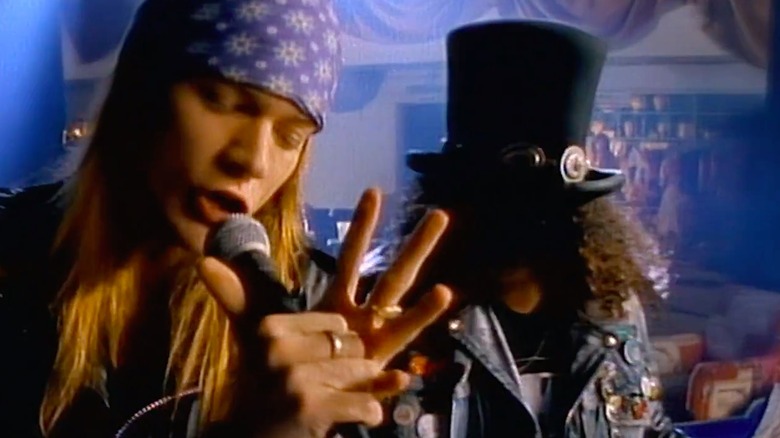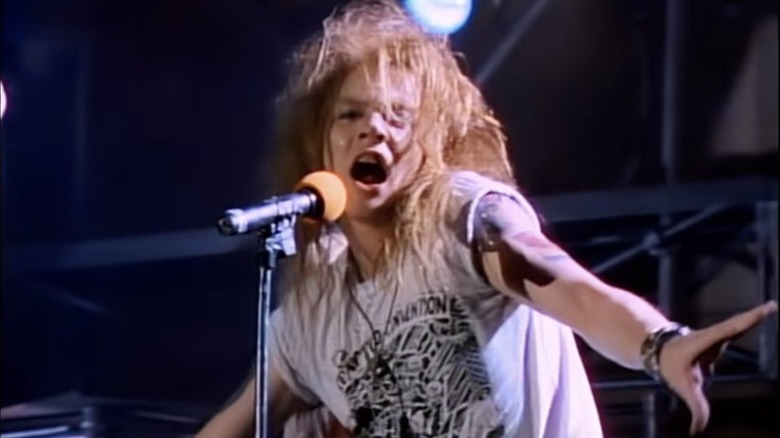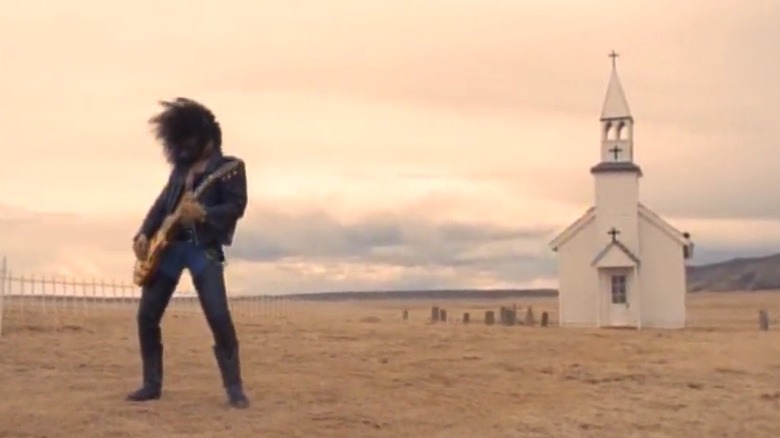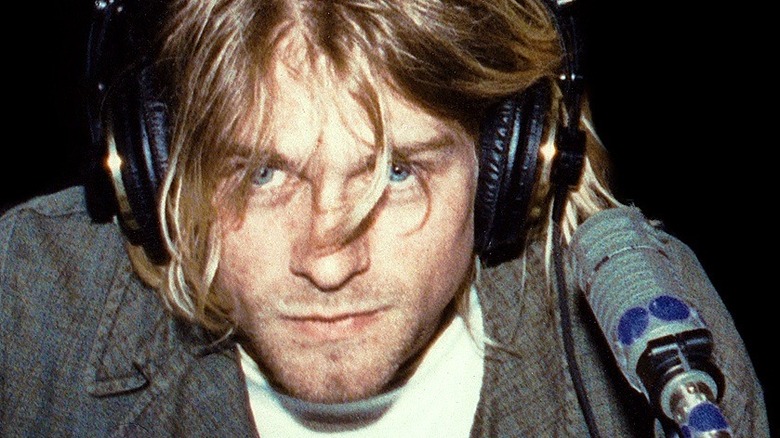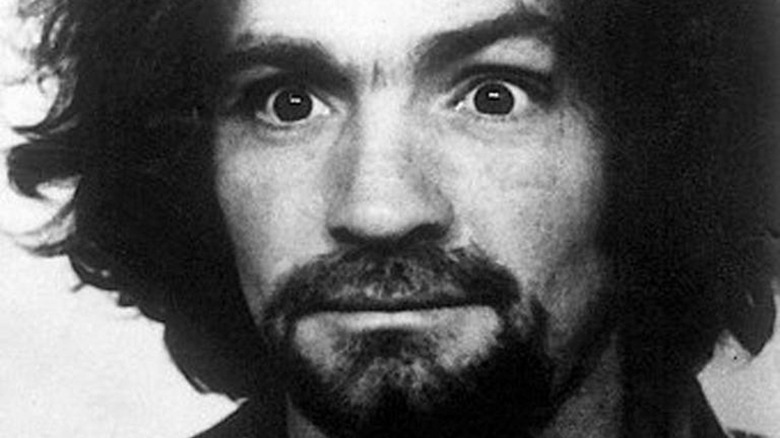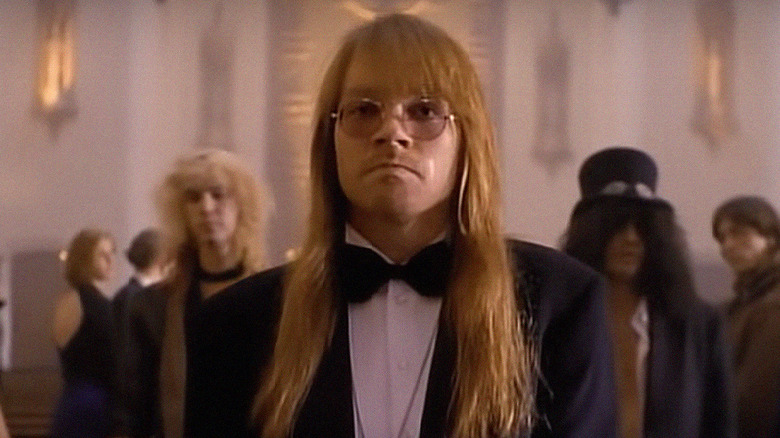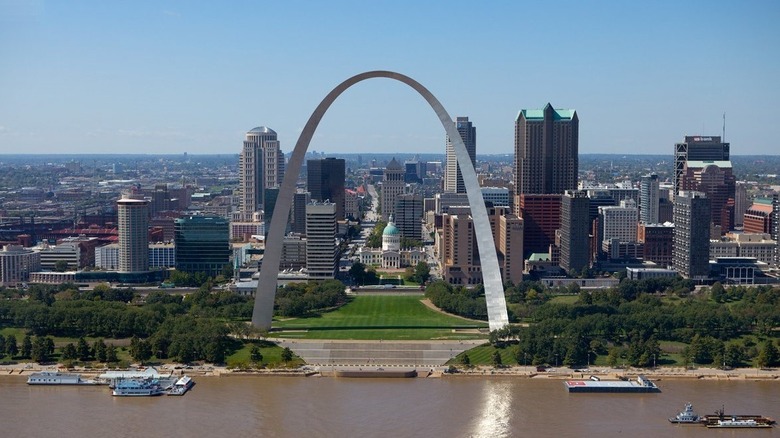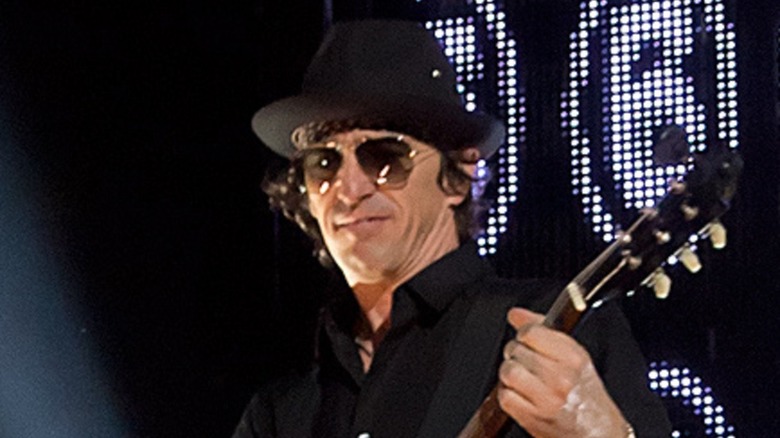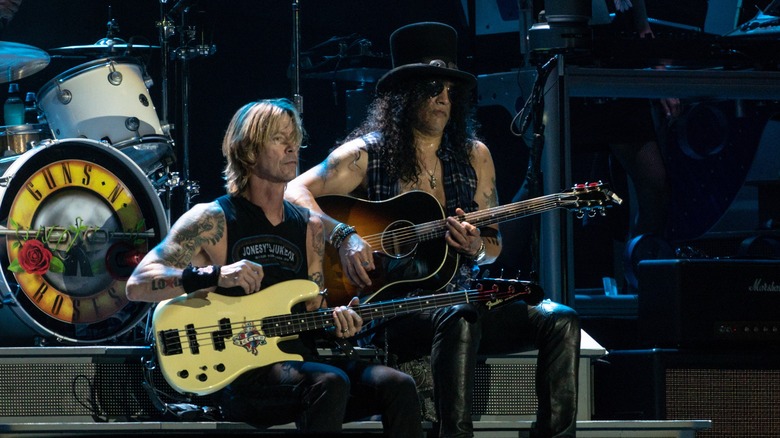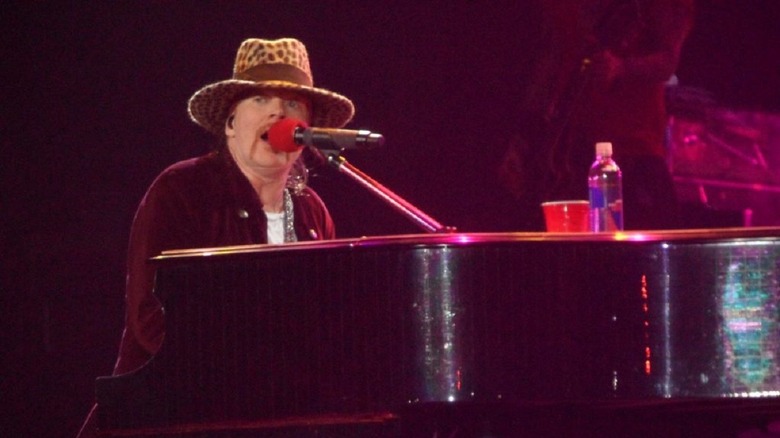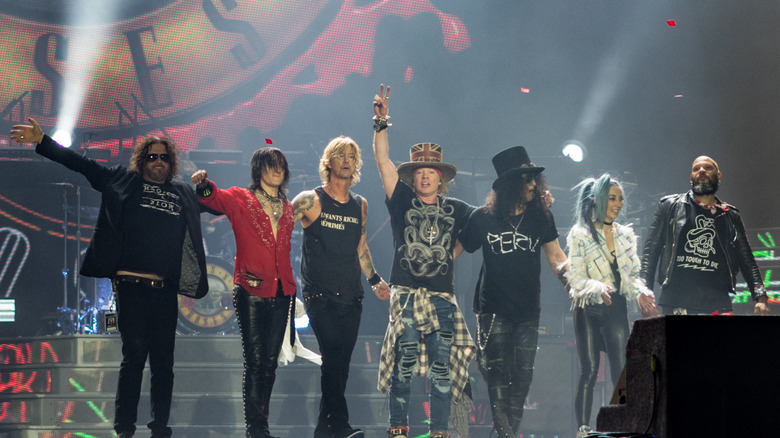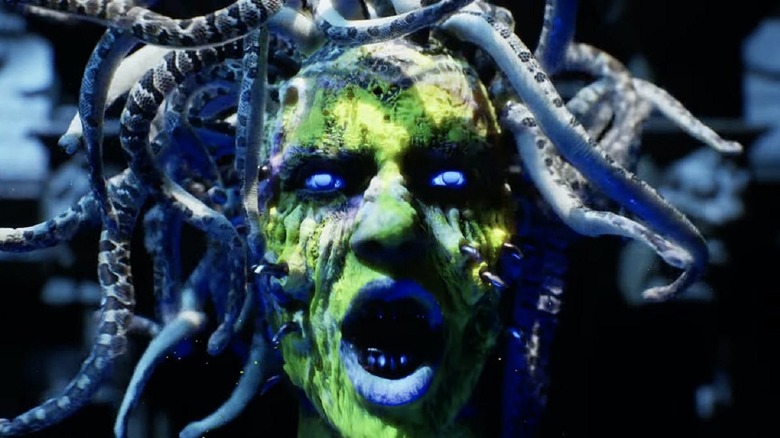The Untold Truth Of Guns N' Roses
From the moment the intro of "Welcome to the Jungle" burst out of radios in 1987, listeners knew they were hearing the next evolution of hard rock. The genre that had come to be defined by long hair, glitter, and cheesy guitar solos was shaken to its core by Guns N' Roses.
The original lineup had wide-smiling LA-raised Steven Adler on drums, athletic blond Michael Andrew "Duff" McKagan on bass, soulful wanderer Izzy Stradlin on rhythm guitar, future guitar legend Saul "Slash" Hudson on lead guitar, and ball of energy Axl Rose equal parts screaming and singing in his own unique style at the front.
Where other LA rock bands combined lyrics about parties, narcotics, and women with hairspray, improbably tight jumpsuits, and the occasional early bedtime, Guns N' Roses were proud to be grit through and through. Sure, they went in for backcombing, but they also went for brawling, boozing, shooting up, and as much sex as they could manage in a day and night.
The people around the band quickly realized that GNR was either going to explode into astronomical success or implode and become just another could've-been rock 'n' roll casualty. In some ways, GNR did both. They released the best-selling debut album of all time, but a decade later, Rose was the only original member left ... and four years into an album that would take another 11 years to limp into the daylight. However, GNR still exists — and it recently got a second chance.
Four original Guns N' Roses members met in school
We can thank two schools for inadvertently laying the foundations of Guns N' Roses. Izzy Stradlin (then Jeff Isabelle) and Axl Rose (then Bill Bailey) met at Jefferson High School in Lafayette, Indiana. They bonded over a love of music — drummer Stradlin convinced Rose he could be a singer — and hatred of their small town. Stradlin later described their teenage friendship to Louder as "pretty 'Beavis And Butt-Head.'"
A few years earlier, Steven Adler (then Michael Coletti) and Slash (then Saul Hudson) had become friends at middle school in LA. They briefly formed a band at Fairfax High, before they both dropped out.
Stradlin graduated from high school in 1980 — the only original GNR member to do so — and moved to LA, where he joined and left various bands, trading the drums for bass and finally guitar. Two years later, Rose moved to LA, too. Alongside guitarist Chris Weber, Stradlin and Rose formed a band they eventually named Hollywood Rose and started writing songs that would later be released by GNR.
Meanwhile, Adler and Slash had reunited, playing together in a band called Road Crew. Adler later told Rolling Stone that they learned about Hollywood Rose (or whichever of the many names the band was using at the time) from a flyer they saw on Sunset Boulevard. After watching the band perform, Adler and Slash briefly joined. But it took another split and a reunion before GNR was born.
Seattle transplant Duff McKagan was the missing piece of Guns N' Roses
In the fall of 1984, Slash and Steven Adler put out a classifieds ad for Road Crew recruits. They met bassist and self-described "punk kid from Seattle" Michael Andrew McKagan, aka Duff. Recalling the first time he heard Slash play, Duff later said (via Rolling Stone), "I'd never been in a room with a guy my age who played guitar like that." However, he was looking for something more organized. They stayed friends, and Slash and Adler concentrated on Hollywood Rose until the band split.
According to Tracii Guns, a guitarist who was friends with Axl Rose and Izzy Stradlin, he invited Rose to join his band, L.A. Guns. Rose was eventually fired by the manager, and he and Guns teamed up, combining their surnames to create Guns N' Roses.
Rose asked Stradlin to join, and he brought along his new neighbor – some kid from Seattle who played bass and went by "Duff." Still keen to avoid wasting time, McKagan organized a West Coast tour to test his new bandmates' commitment. Guns (the lead guitarist) and the drummer dropped out — and Rose and Stradlin replaced them with their ex-Hollywood Rose bandmates, Slash and Adler.
It was June 1985. After a few studio rehearsals, Guns N' Roses hit the road. And then they stood at the side of the road: Their car broke down almost immediately. Hitchhiking for 1,100 miles cemented their bond — and potentially served as an omen of the chaotic magic to come.
Appetite for Destruction was fueled by chemistry and chemicals
Guns N' Roses started attracting local attention immediately, partly for their high-energy performances and partly for their offstage antics. Despite the hype, some labels were wary of the band's unpredictable reputation.
GNR ultimately signed with Geffen in 1986 and started working on their first studio album, "Appetite for Destruction." The band drew on the sex, drugs, and rock n' roll that was all around them, especially the first two. They already had several songs from the various members' times in other bands. For example, "Rocket Queen" originated with Duff McKagan and Steven Adler in Road Crew, and "Anything Goes" was co-written by Chris Weber in Hollywood Rose.
Adler maintains that the band was tight-knit and relatively clean-living while recording "Appetite" with producer Mike Clink, starting in January 1987. He said that they all lived and partied together and that although he smoked weed and drank "a little alcohol," he didn't use heroin. He said that Slash and Izzy Stradlin occasionally used the latter, but overall, they all focused on making "the greatest record ever."
Others remember it differently. Engineer Micajah Ryan told Billboard that the bandmates all recorded at different times. Axl Rose, in particular, liked to track his vocals alone. According to GNR accomplice Marc Canter, while working on the EP that preceded the album, the band was "completely out of control" (via Loudwire), including the usually relatively sober Rose. They were also regularly arrested for public drunkenness, resulting in 5 a.m. calls to management.
If you or anyone you know is struggling with addiction issues, help is available. Visit the Substance Abuse and Mental Health Services Administration website or contact SAMHSA's National Helpline at 1-800-662-HELP (4357).
Appetite for Destruction went from slow burn to firestorm
Although people working on "Appetite for Destruction" knew they were creating something special, they didn't predict how special. Izzy Stradlin hoped to sell 2 million copies, while engineer Micajah Ryan predicted a less optimistic 200,000, given that the frequent use of the F-word limited potential radio play.
Ryan's suspicions nearly proved correct. When the album was released on July 21, 1987, the cover alone had already caused controversy. It was a 1978 artwork from which the album took its name, one that appears to depict sexual assault. The cover was replaced, although manager Alan Niven later told Billboard that a ban was the plan, intended to stoke publicity.
Some of that intentional provocation initially hurt the album. MTV refused to play the video for single "Welcome to the Jungle," concerned that the song's not-exactly-wholesome themes would see it dropped by the local cable providers it relied on. Despite Rose's dismissal of the network as "so f***ing boring," without MTV's audience, sales stalled.
Niven launched a campaign to convince MTV to play the video, deploying various underhanded tactics. Ultimately, he believes it was a strongly worded letter he wrote to the head of programming that worked. MTV played it at 5 a.m. on a Sunday — and immediately, viewers started calling in endless requests for more.
From then on, the video became an MTV mainstay, and album sales soared. "Appetite" is still the best-selling debut album of all time, according to Billboard, with 30 million sales to date.
Guns N' Roses made other rock bands look like church choirs
The 1980s LA music scene was an unending nightclub line of long-haired, guitar-wielding, tight-leather-pants-wearing wannabe rock stars. Many five-dude bands sang about wild parties, getting high, and sexploits with women they didn't exactly hold in high regard. However, whereas most of those bands were exaggerating their rock star lifestyles, if anything, Guns N' Roses was up to a lot more than even their not-exactly-demure catalogue suggests.
The band's consumption of mind-altering substances was prodigious. Tom Zutaut, who signed GNR to Geffen, told Loudwire, "Guns N' Roses were able to consume those things, yet, deliver ... there are plenty of bands that probably did less heroin ... and drank less alcohol, but imploded." However, most of the original lineup would ultimately go into treatment for various addictions.
GNR's approach to what could politely be called romance can be summed up in the Adriana Smith saga. The moans toward the end of "Rocket Queen" were provided – live — by "Band-Aide" Smith, with, ahem, help from Axl Rose. But Smith was dating Steven Adler, according to Ultimate Classic Rock. Except Adler had cheated on her: Smith had already sought revenge with Rose once (and she told the Mirror Slash was present that time but not involved). Adler later described Smith as one of "eight or nine strippers who were part of our little clan. She just happened to be one I was making out with at the time." Meanwhile, the eponymous Rocket Queen was actually Rose's favorite brothel owner.
Guns N' Roses enjoyed feuding with other bands
Even before they became famous, Guns N' Roses made a hobby of trash-talking other LA bands. Having lived up to those boasts, they started going after relatively well-known musicians. Slash started a feud with Poison, who typified what GNR saw as all talk, no perp walk. According to Louder, the two bands took the feud to the streets: They covered up each other's flyers. Rolling Stone reported that at one point, two members of Poison were charged with misdemeanors for pouring beer on GNR's publicist.
The most famous musical GNR feud was with fellow superstars Nirvana. The real reason Kurt Cobain hated Guns N' Roses (and it was mutual) had less to do with music — several GNR members, including Axl Rose, initially liked Nirvana – and more to do with their respective philosophies.
Several Guns N' Roses songs include lyrics that have been described as misogynistic, racist, and homophobic. The band has defended these as ironic and misunderstood, although one song — "One in a Million," in which Rose, who is white, used the N-word — was pulled from a rerelease of "Appetite" in 2018. In contrast, as the BBC reports, Cobain regularly spoke out against all of these forms of discrimination, at a time when few public figures were willing to do so.
Things escalated at the 1992 MTV Movie Awards, when the two bands nearly came to physical blows. Various members eventually made up: GNR's Matt Sorum and Nirvana's Dave Grohl are still friendly.
Guns N' Roses' most notorious song was controversial even for them
Guns N' Roses were never afraid to dive into controversy. They've been accused of endorsing drug use, xenophobia and racism, and violence against women, all of which they deny. However, GNR's most controversial song wasn't notorious because of its lyrics — it wasn't even written by them. Which was the problem.
GNR's 1993 covers album "The Spaghetti Incident?" included a song, "Look at Your Game, Girl," written by Charles Manson. Yes, that Charles Manson: abusive cult leader, white supremacist, mastermind of a series of violent murders, and aspiring rock star.
Manson was sentenced to life in prison in 1972. In 1993, The Baltimore Sun reported that he would receive $62,000 in royalties from every 1 million copies of "Spaghetti" sold. It wasn't just the money: Axl Rose had already been accused of espousing white supremacy on "One in a Million." Recording a Manson song seemed like a tacit endorsement of the cult leader's racist ideology.
Rose defended the song. He said the track was intentionally hidden — tacked onto the previous song and not listed — and that he would donate any money he made from it to an environmental group. Ultimately, Manson didn't make any money from the use of his song. Thanks to a court order from 1971, the money went to the son of Manson Family victim Wojciech Frykowski. But although previous GNR albums had hit at least 5 million domestic sales, "Spaghetti" only sold around 1 million copies.
Creating Use Your Illusion may have been even more chaotic than Appetite
Guns N' Roses followed the explosive success of "Appetite" with the mostly forgotten "GNR Lies" in 1988. They returned to groundbreaking form — and mayhem — with 1991's two-volume "Use Your Illusion."
According to Rolling Stone, GNR started working on "Illusion" in June 1989. At a dysfunctional session in Chicago, they realized that they had about 35 songs. But Izzy Stradlin, Steven Adler, and Axl Rose consistently failed to show up. In August, Stradlin was arrested and court-ordered to get sober. He did — which alienated him from the rest of the band, who were using heavily. Rose was also frustrated. In October 1989, he had called out his bandmates' heroin use live on stage while supporting the Rolling Stones, causing tension.
Despite the friction, the band wrote most of the "Illusion" songs between that summer and January 1990, when they went to the studio. But the drug issue spilled into the sessions. When heroin-addled Adler couldn't play the drum tracks anymore, he was kicked out and replaced with the Cult drummer Matt Sorum. Rose also added keyboardist Dizzy Reed.
Again, despite the chaos, the band was efficient at recording the basic tracks, only needing two or three takes. In addition to the new songs, they recorded covers that were ultimately released on 1993's "The Spaghetti Incident?" and revisited songs that had been cut from "Appetite." However, Rose's obsessive production irritated Slash, who was anti-synths and pretentiousness, and Stradlin, who resented the drawn-out process.
Guns N' Roses caused riots on tour
By the time Guns N' Roses took "Use Your Illusion" on a two-and-half-year tour, their live shows were already infamous. Worst of all, in August 1988, 30 people were trampled and two crushed to death when the band took the stage at a festival in Donington, U.K.
In GNR's defense, that incident had more to do with bad crowd management than anything the band did, and Axl Rose tried to calm fans down. Izzy Stradlin and Duff McKagan, at least, were both haunted by what happened. But on the "Illusion" tour, Rose deliberately provoked audiences. Stradlin told Louder that he never knew whether they would make it through the whole set before Rose walked off. According to VICE, Rose once turned up late to a show in Florida because he was watching "Teenage Mutant Ninja Turtles 2."
In July 1991, there was a major incident at the Riverport Amphitheatre near St. Louis, Missouri. Mid-set, Rose dived into the crowd because a fan was filming him. Fighting his way out, he announced that he was going home. The arena erupted. Outnumbered police attempted to use underpowered fire hoses to restore order. Slash later recalled seeing people covered in blood, being carried out on stretchers. Billboard reports that 65 people were injured, including 25 police officers. Rose was charged with four misdemeanors and fined, and he and the band were sued in civil court. GNR were unofficially banned from performing in St. Louis. However, they returned in 2017.
Izzy Stradlin left Guns N' Roses in 1991
Izzy Stradlin had started to feel alienated from his bandmates even before he got sober. He told Louder that they had stopped just "hanging out" and messing around with music. As each started using drugs and alcohol more frequently and more intensely, the substances took over their lives.
After getting sober, Stradlin tried to distance himself from the band as much as he could while still being on tour with them. He traveled separately on the road while they took planes and found it difficult to watch what he perceived as his friends' self-destruction. Even though Rose was usually relatively sober, at least compared to his bandmates, the frontman's outbursts and walkouts put Stradlin on edge. "You get to the point where you're like, you know, 'Am I gonna carry on like this or am I not?' And I said I'm not," he told an interviewer in 1992.
Stradlin quit Guns N' Roses in November 1991. The first thing he did was hit the road again, taking a cross-country vacation that included seeing the Grand Canyon and surfing in Florida. After that, he formed his own band, Izzy Stradlin and the JuJu Hounds, replacing thrashing guitars and screaming vocals with a more '60s vibe: Ronnie Wood of the Rolling Stones even made a guest appearance on the band's self-titled album. Stradlin went back on tour, happily trading arenas for clubs. Meanwhile, his GNR spot was taken by Gilby Clarke, who was fired in 1994.
Why Duff McKagan and Slash left Guns N' Roses
By 1995, Guns N' Roses hadn't released new studio music since 1993's covers album "The Spaghetti Incident?" The duo considered the core of the band — Slash and Axl Rose — were at loggerheads. In 1997, a year after he officially left, Slash blamed "a difference of opinion as far as musical direction."
This was partly true, but Rose's controlling behavior contributed to the tension. He'd reportedly forced his bandmates to sign contracts, and had fired Gilby Clarke without their input. Slash didn't like Clarke's replacement, Paul Tobias. The breaking point came when Rose asked Tobias to re-record some of Slash's guitar parts on GNR's cover of "Sympathy for the Devil" for the film "Interview With a Vampire" — a song Slash hadn't wanted to make.
After a break, Slash briefly rejoined GNR. But on October 31, 1996, Rose sent a fax to MTV — no longer boring, apparently — announcing that Slash "has been 'OFFICIALLY and LEGALLY' outside of the Guns N' Roses Partnership since December 31, 1995" (via Ultimate Classic Rock).
Slash was followed out the door in 1997 by drummer Matt Sorum, whom Rose fired, and original bassist Duff McKagan. McKagan's alcohol and cocaine consumption escalated on and after the "Illusion" tour. In 1994, he was hospitalized for a ruptured pancreas and told that if he drank again, he would die. Three years later, McKagan had gotten sober and become a father, and GNR had stalled. He quit the band to focus on parenthood and other projects, including business school and mountain biking.
The new Guns N' Roses took a long time to record an album
After Duff McKagan's departure in 1997, Axl Rose was the only original Guns N' Roses member left. Even then, GNR became a constantly revolving door over the next few years. Although the band played live, often to huge crowds, "Chinese Democracy" — the long-promised follow-up album to "The Spaghetti Incident?" but mostly to "Use Your Illusion I and II" — failed to materialize.
Just as material written for the original GNR's previous bands ended up on "Appetite for Destruction," and songs for that album ultimately ended up on "Illusion," GNR had started working on "Democracy" in 1994, before everyone but Rose left. Tom Zutaut, who had been fired and then rehired specifically to help with "Democracy," told Louder that by 2001, there were 50 to 60 songs in the draft stage. The problem was editing that down to an album's worth and then finishing those songs to Rose's satisfaction.
Rose blamed GNR's ever-changing member list for the delays. It didn't help that he didn't want band members who weren't in the current lineup to appear on the record, which led to re-recordings of various parts. Rose constantly changed his mind over what to include and how to edit tracks. Zutaut was fired again. GNR went through six producers — and $13 million. In 2004, Geffen told Rose he would have to fund the rest of the album.
When "Chinese Democracy" was finally released in 2008, it sold well but received mixed reviews.
The never-gonna-happen Guns N' Roses reunion happened in 2016
There have been plenty of mini Guns N' Roses reunions, under different names. Duff McKagan, Slash, and Matt Sorum played together in supergroup Velvet Revolver. Izzy Stradlin stepped in for Gilby Clarke in GNR when the latter was injured in 1993 and played a few shows in 2006, according to The Hollywood Reporter. McKagan and Clarke opened for Slash with their respective bands in 2015 and joined him for a few songs. In 2012, when GNR was inducted into the Rock 'N' Roll Hall of Fame, McKagan, Clarke, Sorum, Slash and Steven Adler performed three songs at the ceremony. Rose didn't attend.
A key feature of revolving doors is that they turn full circle. The moment GNR fans had been dreaming about finally happened on April Fool's Day (April 1) 2016. McKagan and Slash played with Rose and GNR for the first time since 1993. The other members of the band were Dizzy Reed on keyboard, Richard Fortus on rhythm guitar, Frank Ferrer on drums, and second keyboardist Melissa Reese. The venue was poignant: iconic Hollywood club the Troubadour, which had hosted the debut of the classic GNR lineup on June 6, 1985.
The new-old lineup embarked on a tour aptly named Not in This Lifetime. It sold over 5 million tickets and made $548.2 million. Stradlin declined to join in 2016 because he felt the money wasn't being split fairly. But McKagan, Slash, and Rose are, as of 2021, still touring. To quote Slash, "Never say never..."
Guns N' Roses released new music in 2021
The Guns N' Roses reunion has moved from stage to studio. As Rolling Stone reports, at a gig in Boston's Fenway Park on August 3, 2021, Rose told the crowd that they might recognize the next song "under a different name," and that the band was about to try something "absurd." GNR then launched into what turned out to be a new single, "ABSUЯD." Not entirely new: it's a reworking of "Silkworms," a song written during the expansive "Chinese Democracy" era.
Two days later, on August 5, the official GNR Twitter account tweeted "New. Fn. Song." with a short clip featuring a video of a Medusa figure, and a link to stream "ABSUЯD." This was momentous. GNR hasn't put out new studio music since "Chinese Democracy" in 2008, which was itself a long, torturous time in the making. Does this surprise single indicate a period of creative inspiration? Does the lack of fuss indicate creative cohesion?
Being the first song GNR has released in 13 years would be momentous enough. But "ABSUЯD" is also the first song to feature Duff McKagan and Slash since 1993's "The Spaghetti Incident?" And given that much of "Spaghetti" was recorded during the "Illusion" sessions, it may have been even longer since the duo worked with Rose in the studio (a notoriously difficult process.) Those who have gotten their hopes up before daren't whisper the word "album" just yet. But more absurd things have happened.
